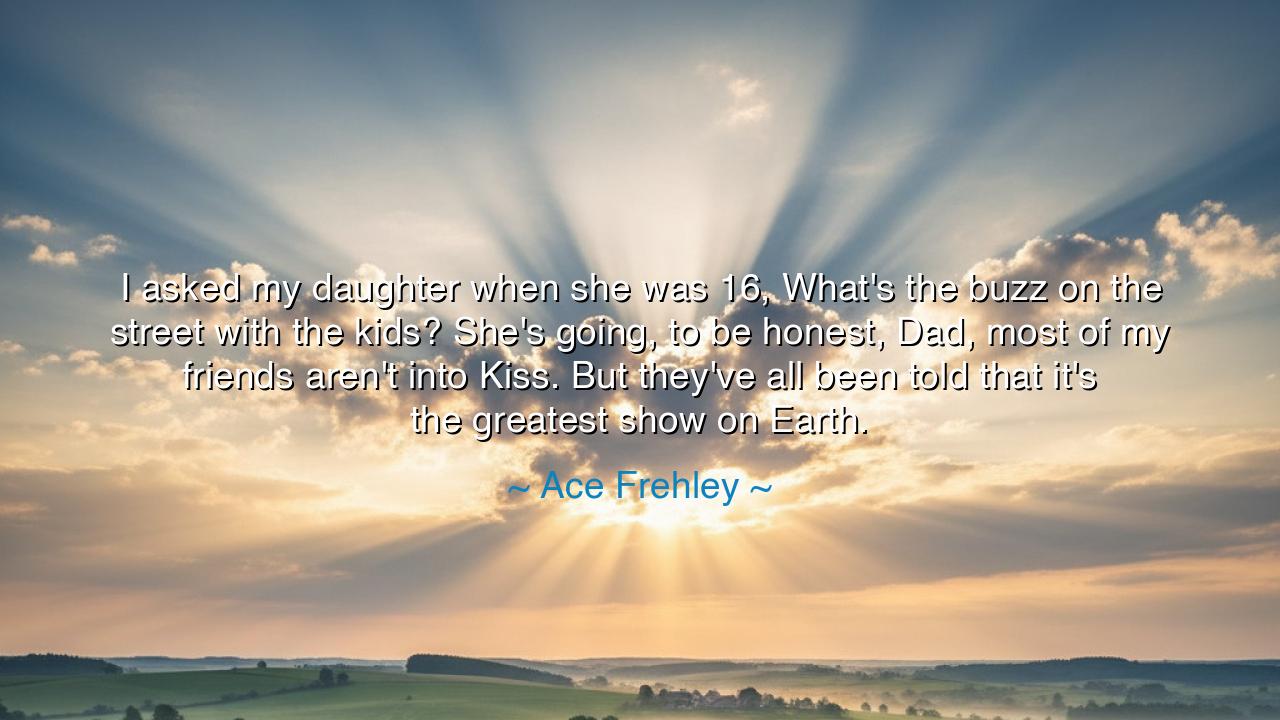
I asked my daughter when she was 16, What's the buzz on the
I asked my daughter when she was 16, What's the buzz on the street with the kids? She's going, to be honest, Dad, most of my friends aren't into Kiss. But they've all been told that it's the greatest show on Earth.






Hear now the words of Ace Frehley, the Spaceman of KISS, who once confessed: “I asked my daughter when she was 16, What’s the buzz on the street with the kids? She’s going, to be honest, Dad, most of my friends aren’t into KISS. But they’ve all been told that it’s the greatest show on Earth.” Though spoken in the plain tongue of father to daughter, these words bear the weight of a timeless lesson. They tell of legacy, of reputation, of the strange power of myth—that even when passion fades among the living, the echo of greatness remains and passes from mouth to mouth like fire in the night.
The first truth is found in the humility of the question: “What’s the buzz on the street?” Here is the artist, once adored by millions, seeking not the flattery of crowds, but the honest voice of the young. It is a reminder that no glory is eternal in its freshness; generations rise with new tastes, new loves, new heroes. Yet Frehley’s inquiry shows wisdom—he wishes to know the truth, to see his art not through nostalgia, but through the living eyes of youth.
Then comes the answer: “Most of my friends aren’t into KISS.” This is honesty, sharp as a blade. The fire of fame does not burn forever in every heart. What was once the sound of rebellion and freedom to one generation may feel distant to the next. And yet—there is something greater revealed in the daughter’s words. For though they may not follow the music, they have all been told the story. They have heard of the legend. They know of the spectacle, the thunder, the face paint, the fire—KISS as “the greatest show on Earth.”
This is the second truth: reputation, like myth, survives even when direct passion cools. Just as the tales of Achilles outlived the Greeks who sang them, or the legend of the Roman gladiators lives though no man has seen them fight, so too do the stories of great performers echo down through time. The daughter’s friends may not wear the shirts or buy the records, but they know of the greatness, for the story has been passed to them as inheritance.
History offers us a mirror in the plays of Shakespeare. In his own age, many came to his theater for simple amusement. Centuries later, few read him for laughter alone, but the name of Shakespeare carries weight, a reputation so mighty that even those who have never read his words know he is called the greatest playwright. This is what Ace Frehley touched upon: legacy endures beyond taste, beyond fashion, beyond the shifting winds of culture.
What lesson, then, shall we take? That in life we must build not only for the present, but for the enduring. Do not strive merely to please the crowd of today, for their passions will pass. Instead, strive to create something so bold, so honest, so alive, that even when forgotten by some, it will still be remembered as legend. Greatness is not only in popularity, but in the story that remains after the music fades.
Practical wisdom follows: whatever your craft, your work, or your art, ask not only how it pleases now, but how it will be remembered. Live and create in such a way that others will tell your story even when you are gone. Do not fear if the world moves on to new things; what matters is that your name, your deeds, your “show” leaves a mark so deep that it echoes through generations.
Thus, take to heart the words of Ace Frehley: “Most of my friends aren’t into KISS. But they’ve all been told that it’s the greatest show on Earth.” Let them remind you that fleeting approval is nothing beside lasting legacy. Build your life so that long after you are gone, others will still say: I never saw him, but I heard he was great. And in that remembrance, your spirit will live forever.






AAdministratorAdministrator
Welcome, honored guests. Please leave a comment, we will respond soon